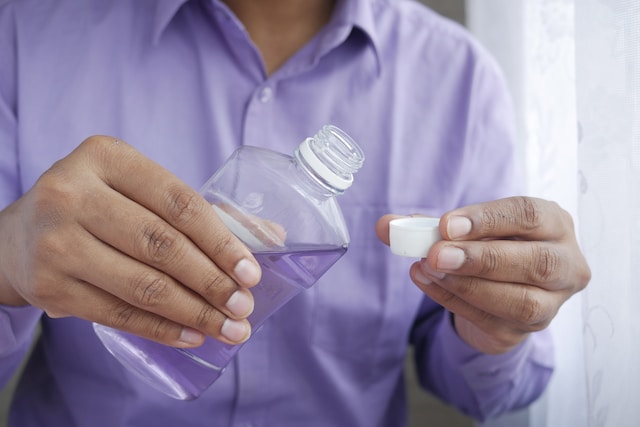
Mouthwash is a popular dental hygiene product that can help reduce plaque and bacteria build-up in the mouth.
However, many mouthwash users experience a burning sensation when they use the product.
While this may be normal for some individuals, others may find it uncomfortable or even painful.
In this article, we will explore why mouthwash burns and what can be done to reduce the burning sensation.
What causes mouthwash burning?
Mouthwash is an antiseptic solution that typically contains some ingredients.
These ingredients can irritate the mouth and cause a burning sensation when used in excess or for prolonged periods of time.
Alcohol content
Mouthwash usually contains alcohol at concentrations of up to 25%. This can cause irritation and burning in the mouth, especially if the product is used frequently.
Additionally, alcohol-based mouthwashes can sometimes dry out the mouth and make it more susceptible to infection.
To reduce this sensation, some people opt for alcohol-free versions of mouthwash.
Peroxide content
Another common ingredient in mouthwash is hydrogen peroxide, which can also cause a burning sensation in contact with the sensitive tissues of the mouth.
If used in high concentrations or for prolonged periods of time, it can lead to irritation and discomfort.
Notably, hydrogen peroxide is an important ingredient in whitening products, which can cause stinging and burning if not used correctly.
Essential oils
Essential oils are often included in mouthwashes to help improve the taste and provide additional benefits.
However, some of these essential oils may have harsh properties that can lead to burning in the mouth.
Peppermint oil is a popular choice, but it can cause irritation if used in excess or for too long.
Reducing the amount of essential oils in your mouthwash may help reduce discomfort.
- Read also: What Is The Benefits Of Cold Showering For Your Health
- Read also: What Happens if You Swallow Gum
Does everyone experience burning?
Though burning and irritation are common reactions to mouthwash, not everyone experiences it.
People with sensitive mouths may be more prone to the sensation, as can those who use mouthwash too often or for too long.
Additionally, some people may find that certain ingredients cause a stronger reaction than others.
How to reduce the burning sensation?
There are several ways to reduce the burning sensation associated with mouthwash. These include:
Swish less
Swishing for longer than recommended can lead to increased irritation and burning, so reducing the length of time you swish can help prevent discomfort.
Additionally, many products will advise that the solution should not be held in the mouth for more than 30 seconds at a time.
Use an alcohol-free version
The alcohol content in mouthwash can contribute to burning and irritation, so opting for an alcohol-free version may help reduce discomfort.
These products usually contain natural ingredients such as aloe vera, baking soda and peppermint oil that are gentler on the mouth.
Additionally, they may still be effective against plaque build-up and bad breath.
Increase water intake
Increasing your water intake can help minimize mouthwash-related burning.
Drinking more water helps keep your mouth hydrated, which can reduce the effects of alcohol and peroxide in the product.
Additionally, it can also help flush away any bacteria or plaque that may contribute to bad breath.
Reduce the amount of essential oils
Using too many essential oils in a mouthwash can lead to burning and irritation, so reducing the amount may help reduce this sensation.
Additionally, some products will also contain additional ingredients that can cause discomfort when used in excess. It is best to consult the manufacturer’s instructions before use to reduce irritation.
Use cool water
Rinsing with cool or lukewarm water after using mouthwash can help reduce the burning sensation.
The cold water will act as a shock absorber, calming the sensitive tissues in your mouth and reducing the irritation caused by ingredients such as alcohol and hydrogen peroxide.
Additionally, it can also rinse away any remaining bacteria that could contribute to bad breath.
Dilute the mouthwash with water
Diluting the mouthwash with cool or lukewarm water can also help reduce any burning sensation associated with it.
This will reduce the concentration of active ingredients, lowering their potential to irritate your mouth.
Additionally, you should always rinse thoroughly after use to ensure that all residue is removed.
- Read also: Do Cold Showers Burn Fat
- Read also: Can Juicing Help You Lose Weight
Conclusion
Mouthwash can provide a variety of benefits, but it is important to use them correctly to avoid irritation.
Burning or stinging sensations are common reactions to the product, and they may be caused by alcohol, peroxide or essential oil content.
Reducing the length of time you swish, using an alcohol-free version, increasing your water intake and diluting the mouthwash with water can all help reduce the burning sensation and allow you to enjoy a fresh breath without discomfort.
By following these tips, you can still achieve the desired results while minimizing any discomfort associated with mouthwash.
Everyone’s experience with mouthwash is unique, so it may take a bit of experimentation to find the right product and method that works best for you.
Ultimately, this will allow you to enjoy a healthy smile without any burning sensations.



